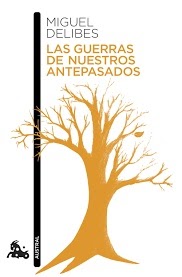
Original Language: castellano
Year of publication: 1975
Valoración: Highly recommended
Miguel Delibes has a few reviews in this blog, with some very positive assessments and others not so much, a little of everything. In the comment to one of those entries I said something like that I was not one of my favorite authors, and it is true, perhaps because in the small part of his work that I know we weighed, in my opinion in excess, the rural element. That it is true that Delibes describes as few the Castilian landscape, and has an unmatched ability to understand very close characters, simple people of the field whose language, and we would say whose soul, moves to the pages of his books, always from tenderness and a pinch of humor. But, even admitting their virtues, personally the attachment to that world was rather unattractive.
Well, that’s what The wars of our ancestors It places us again, in total immersion plan, in that environment, with its fights between neighboring villages, and works in fruit and hives. But we are not only in the rural world but also in a strongly archaic atmosphere in which the prominence is the men who personify the three generations of the same family. The great -grandfather, the grandfather and the father, all cut by the same pattern, whose fundamental reference is the wars that each one had to live: the Carlist, that of Africa and the civil war. Every man, sooner or later, has (or must have) his war, in which he must show his value based on bayonet or, failing that, knocking down enemies. The problem is that the saga continues on the male side in a very metaphorically called young man Peaceful. This boy has not only absorbed his uncle’s teachings Paco (Observe nature, detect the different language of the rivers, disregard the village struggles), but since childhood shows an unusual sensitivity: it feels pain in the fingers when a tree can be pruned, or in the throat when a trout fish is fished.
Delibes has already presented us with the basic picture of the story, the contrast between primitive barbarism and something that, rather than modernity, has to do with humanity, a different way of seeing the world and moving through it. Other characters will intervene in that dichotomy, although not everything will be as linear as it could be thought, and with the same ability with which the delibes conflict has presented, the narration leads through roads not exempt from contradictions, because in the same character in which that exacerbated sensitivity emerges, a cold -unsuspected coldness arises in a key moments. Maybe because deep down the family blood ends up imposing its seal.
The format used is also a fundamental element: when the story is exposed through a kind of interview to which a penitentiary psychiatrist submits to Peacefulthe author achieves several objectives. The first, freeing the main character so that he can express himself without a clipper in his colloquial, town language, with all the records that delibes dominates perfectly, an effect that would hardly be achieved with an omniscent narrator, and that would be unbelievable in a confession or in memories, where he would surely lose freshness and spontaneity. But it also allows other interesting achievements, such as playing with the contrast to the most cultured and urban language of the interviewer doctor, or opening a hole to small short circuits in communication and humor outbreaks that give the story vivacity and underline the distance between the two worlds that the interlocutors represent.
Surprising episodes such as the apple tree that bear fruit in winter, the suicide of a wild boar, the shower of ostias (sacred) around the mystical grandmother, or the ritual shooting of a dog sometimes border magical realism, such as the crazy escape of a penalty seems to parody, without losing drama, some prison literature. Many elements, gathered and mixed with great skill, which give rise to a really outstanding book that, at least, has led me to delibes a few steps above my initial positions.
Other works by Miguel Delibes reviewed in Ulad: here
Source: https://unlibroaldia.blogspot.com/2025/06/miguel-delibes-las-guerras-de-nuestros.html


